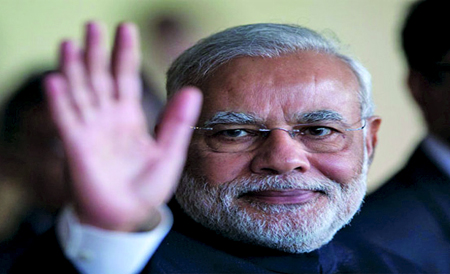 New Delhi, Sept 25: Prime Minister Narendra Modi will roll out a red carpet to attract industrialists to make India a global manufacturing hub, to help create jobs and boost economic growth.
New Delhi, Sept 25: Prime Minister Narendra Modi will roll out a red carpet to attract industrialists to make India a global manufacturing hub, to help create jobs and boost economic growth.
Before he embarks on his high profile US visit slated from September 26-30, Modi will launch the Make in India campaign at a mega event here today.
The campaign is aimed at making India a manufacturing hub, and the government is pulling out all the stops for ensuring a smooth sailing for investors, by setting up a dedicated cell to answer queries of business entities within 72 hours. It will also closely monitor all regulatory processes to make them simple and reduce the burden of compliance.
"The government is committed to chart out a new path, wherein business entities are extended red carpet welcome in a spirit of active cooperation. Invest India will act as the first reference point for guiding foreign investors on all aspects of regulatory and policy issues and to assist them in obtaining regulatory clearances," said an official statement.
Various prominent national and international industry leaders are likely to attend the programme to launch the campaign along with Ministers, senior officials, Ambassadors and opinion leaders.
The government has identified 25 key sectors in which our country has the potential of becoming a world leader. The Prime Minister will be releasing separate brochures for these sectors along with a general brochure.
The brochures covering sectors like automobiles, chemicals, IT, pharmaceuticals, textiles, ports, aviation, leather, tourism and hospitality, wellness, railways among others will provide details of growth drivers, investment opportunities, sector specific FDI and other policies and related agencies.
Investor facilitation cell will provide assistance to the foreign investors from the time of their arrival in the country to the time of their departure, with focus on green and advanced manufacturing and helping these companies to become an important part of the global value chain.
The campaign will be launched at national as well as state level and in Missions abroad. It will target top companies across sectors in identified countries. It also aims to identify select domestic companies having leadership in innovation and new technology for turning them into global champions.
The initiative has its origin in the Prime Minister's Independence Day speech where he gave a clarion call to 'Make in India' and 'Zero Defect; Zero Effect' policy.
A dedicated cell has been created through the web portal (www.makeinindia.com) to answer queries from business entities. While an exhaustive set of FAQs on this portal will help the investor find instant answers to their general queries, the back-end support team of the cell would be answering specific queries within 72 hours.
A pro-active approach will be deployed to track visitors for their geographical location, interest and real-time user behaviour. Subsequent visits will be customised for the visitor based on the information collected. Visitors registered on the website or raising queries will be followed up with relevant information and newsletter.





Comments
Add new comment